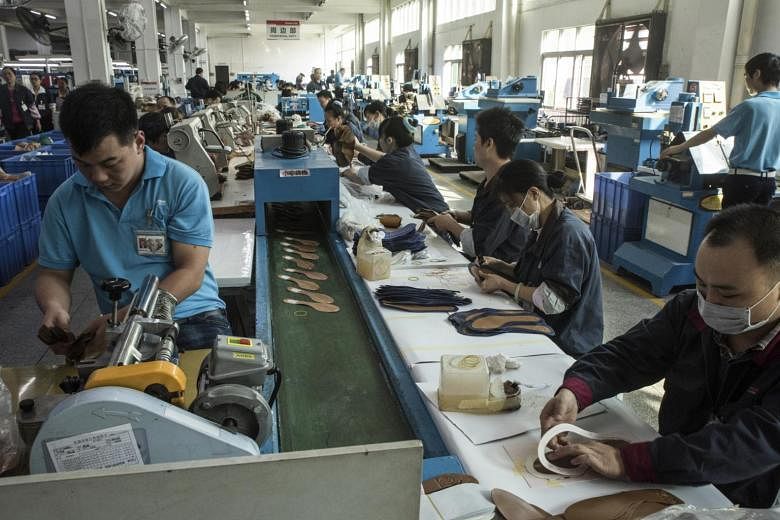SHANGHAI (NYTIMES) - Hua Haifeng started May by taking a job at a factory that made shoes for the Ivanka Trump brand. By the end of the month, Hua, an experienced labour activist, was stranded in a crowded police holding cell, kicked by a fellow inmate and facing long interrogations about a wristwatch with a concealed video camera.
On Monday, in his first interviews since his release on bail, Hua described how he was barred from leaving mainland China, had been denied access to a lawyer, and had to sleep next to a bucket of urine while in custody.
The case involving Hua and two fellow activists has focused unwanted attention not only on poor labour practices in China, but also on the manufacturing operations of Ms Trump, the daughter of US President Donald Trump and a special adviser in the White House.
China Labour Watch, a New York-based labour advocacy group, hired Hua, 36, in early May as a consultant to join two younger activists who had taken jobs at two Huajian International shoe factories in southern China. He was supposed to help them produce videos of labour conditions in the factories, then take them to Hong Kong, Hua said on Monday.
After he found a job at one of the factories in Dongguan, a city in southern China near Hong Kong, he learnt the ultimate target of their efforts: Trump's brand. He said the news made him resolve to be particularly thorough but did not prompt him to worry that the case might be politically delicate.
"I thought President Trump was only doing the president's job, and his daughter was only doing business," he said.
When Hua tried to visit Hong Kong to discuss video details with Li Qiang, founder and director of China Labour Watch, nearly two weeks later, he was stopped by Chinese border police and told he could not leave mainland China. The next day, he fled 400km inland to Ganzhou, the location of the other factory, and met Li Zhao, one of the other China Labour Watch activists.
A day later, the police grabbed both of them and Su Heng, the third activist. The police took them to a detention centre and put each in a different holding cell with common criminals.
Hua ended up in a cell with about 20 other men, who forced him to take the least desirable bunk: next to the urine bucket, where the smell and noise kept him awake at night. When he tried to warn the police the next day that his case would be internationally prominent and should be handled differently, another detainee stopped him with a swift kick.
"It was not a heavy kick," Hua said. "I think he just wanted to warn me and didn't want me to call for meeting the police." During the weeks that followed, Hua said, he was interrogated about 16 times, each time for periods of between 30 minutes and three hours. He was not allowed access to a lawyer for the first week of his detention.
A State Department spokesman urged China on June 5, a week after the activists had been detained, to release the men and grant them legal protections and a fair trial. China rejected that request as an interference in its internal affairs, but soon allowed Hua access to a lawyer for the first time. China Labour Watch says the defendants have had very limited access to lawyers, and that the authorities have pressured the lawyers not to speak about the case.
The State Department spokesman Alicia Edwards also said US companies benefited when undercover labour investigators could help make sure that Chinese manufacturers were respecting labour laws.
Ms Trump has stayed silent about the case since the original detentions, while her company has repeatedly declined to comment and did so again on Monday.
Local officials in Ganzhou released all three on bail from the detention facility on June 28, pending a trial, but have not yet indicted the men on specific charges or set a trial date. The Chinese authorities have repeatedly declined to comment on the case and had no comment on Monday night. Chinese censors have deleted coverage of the case in mainland Chinese online media.
Hua said that he had decided during his four-week detention that he would speak to the news media after his release because he thought the public had a right to know about what he described as excessive work hours and other unfair or illegal labour practices at Huajian.
His two colleagues have kept low profiles since their release and could not be reached for comment on Monday. Li Zhao has changed mobile phones since his release. A relative of Su declined to pass a message on to him.
China Labour Watch has done hundreds of undercover inspections over the years of labour practices in supply chains of multinational companies, including Samsung and Apple. But this case is the first in which the Chinese authorities have detained the group's activists, much less pushed them into the country's labyrinthine criminal justice system, said Li Qiang, the organisation's founder.

